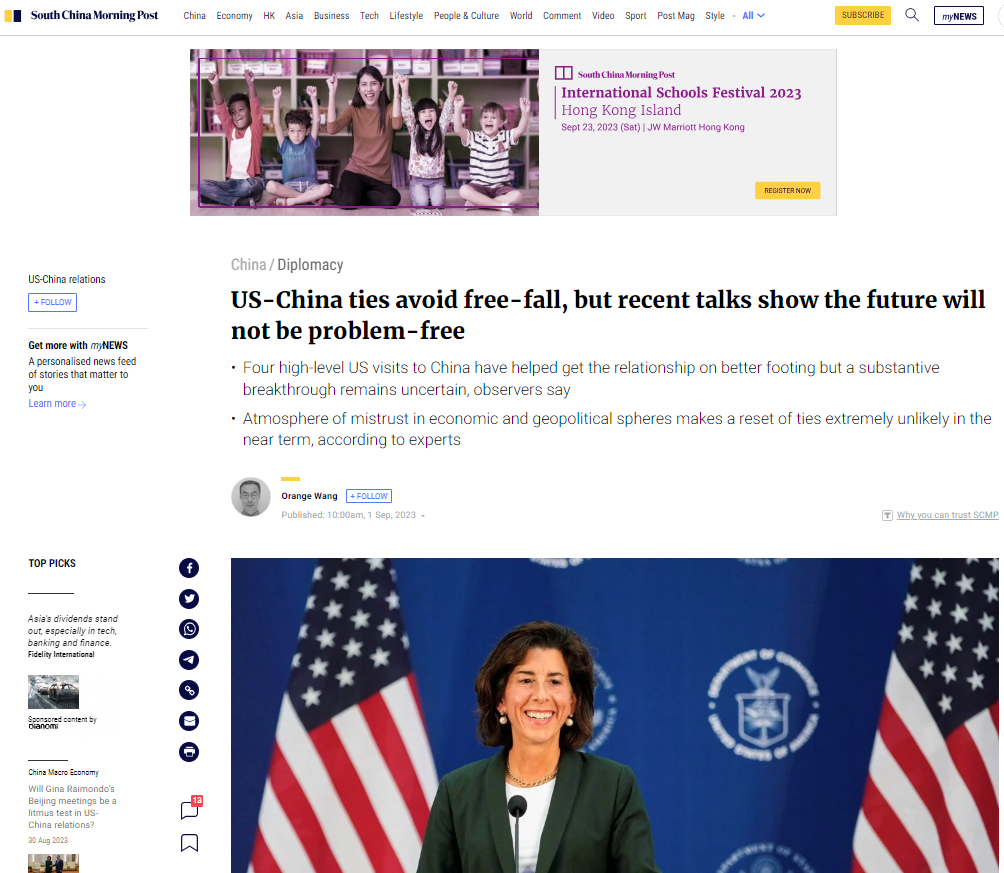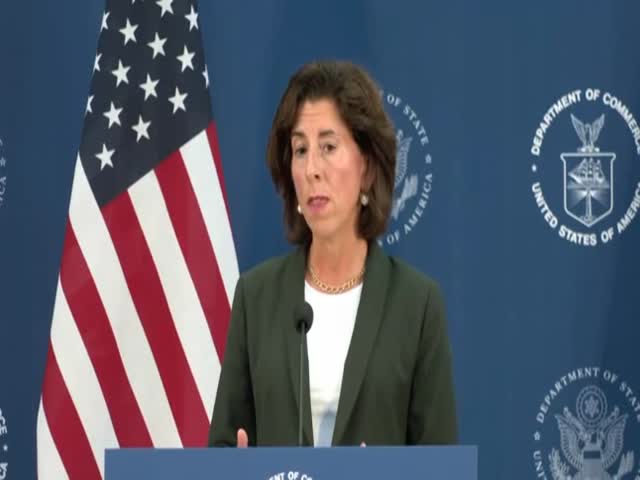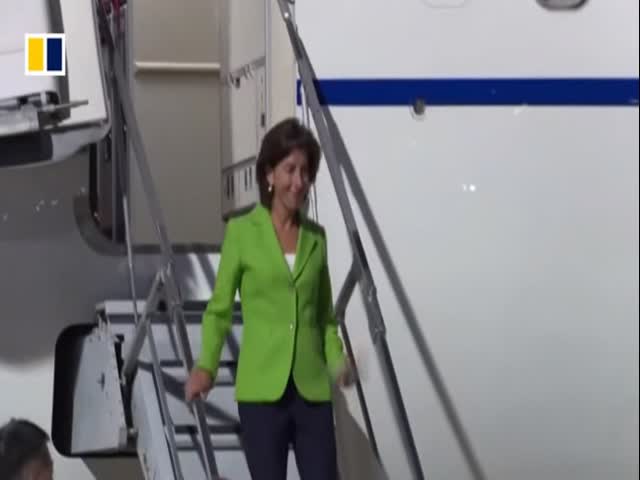LATEST INSIGHTS
Your Present Location: LATEST INSIGHTSWang Wen: US-China ties avoid free-fall, but recent talks show the future will not be problem-free
Source: SCMP Published:2023-09-01

Four recent high-level US visits to China have helped to shore up ties enough to keep the bilateral relationship from slipping into a free-fall, but a substantive breakthrough remains elusive between the rivals, according to experts.
The engagement has raised expectations for a meeting between the country’s two leaders during the coming Apec summit, they said, noting the important role the event plays in ties between the two nations.
The visit to Beijing by US Commerce Secretary Gina Raimondo – the fourth official of the Biden administration to visit China in the past three months – has sounded some upbeat notes in the struggling relationship with a “deliverable” of new communication channels, including a commercial issues working group, an information exchange on export controls, and a China-US tourism summit next year.

Calling her time in Beijing and Shanghai this week “very successful and productive” and “an excellent start”, Raimondo said she was leaving China with “some optimism” as she wrapped up her visit on Wednesday. Before her trip, US Secretary of State Antony Blinken, US Treasury Secretary Janet Yellen and special climate envoy John Kerry have made similar visits.
However, Washington and Beijing have continued to lock horns on a wide range of issues – from a new “Nato-like alliance” in northeast Asia and a tech war, to territorial disputes in the South China Sea and tensions in the Taiwan Strait.
The relationship between the two countries has “structural contradictions”, said Wang Wen, executive dean of the Chongyang Institute for Financial Studies at Renmin University in Beijing.
“Mutual visits by senior officials from both sides can help prevent the bilateral relationship from sliding to its worst level,” he said.
Yun Sun, director of the China programme at the Washington-based Stimson Centre, said that the visits by US cabinet members to China put bilateral ties on “a more positive trajectory for the time being”.
“Concrete progress or deliverables are still being negotiated, but at least such negotiations have begun,” she said. “That is a major improvement from before this summer.
“The depth and sustainability of the positive trend remain to be seen,” she added.
The high-level visits were intended to show US sincerity in mending ties, but the Chinese side has insisted that it wants to see the US gestures of goodwill translated into more robust action, according to Joe Mazur, senior analyst at Beijing-based consulting firm Trivium China.
“None of these visits have produced obvious breakthroughs, with the possible exceptions of the dialogue mechanisms announced during the Raimondo visit,” he said.
The US trips have been widely viewed as efforts to lay the groundwork for the next in-person meeting between US President Joe Biden and his Chinese counterpart Xi Jinping, potentially on the sidelines of the Asia-Pacific Economic Cooperation forum in November in San Francisco.
If that happens, it would be Xi’s first visit to the United States since 2017.
Biden said in August that he expects to meet Xi “this fall” to follow up on their conversation in Bali, Indonesia last November.
“It looks like a Biden-Xi summit during Apec is increasingly likely. It will not be confirmed until later, but I have not seen major key events that undercut the probability,” Sun said.
Wang said that a meeting between the two leaders was crucial to prevent relations from deteriorating further, but added that the Biden administration continued to take steps to encircle and blockade China, contrary to its rhetoric.
“The key to a real warming of the bilateral relationship is for the US to match its words with deeds and to abandon its misconception of China,” he said.
Reciprocal calls for change have also come from the US side.
During her trip, Raimondo pressed top Chinese officials to improve business conditions. Her list of concerns included large, unexplained fines, raids on firms, and the new counter-espionage law – developments that have led leading American businesses to conclude that China is “uninvestable”.

Regarding China’s requests on issues like export controls, she said the US does not want to decouple, but it does not negotiate on matters of national security.
The relative success achieved by the working group during Raimondo’s trip depended on whether Beijing was willing to be forthcoming in a candid, constructive dialogue, said Dennis Wilder, a senior fellow at the Initiative for US-China Dialogue on Global Issues at Georgetown University.
“For the relationship to be completely stabilised, it is important that China begins to send its senior officials to Washington. Wang Yi, for example, has an open invitation,” he said.
Blinken said in early August that he looked forward to meeting Wang, China’s foreign minister, in autumn, but there has been no official confirmation yet.
Meanwhile, talks between the US and Chinese defence chiefs – viewed as critical for the two nations – do not appear to be on the horizon.
As security ties with allies like Japan, South Korea and the Philippines have strengthened in recent months, US and regional warnings have grown louder against Beijing’s “dangerous and aggressive behaviour” in the South China Sea and its policy towards Taiwan, sparking Chinese backlash.
In the hi-tech sphere, Biden in early August unveiled a long-anticipated executive order to restrict outbound direct investment to Chinese companies covering three industry sectors.
Closer American ties with China’s neighbours have exacerbated Beijing’s long-held grievances about encirclement by US allies and partners, said Mazur.
“The atmosphere of mistrust in both the economic and geopolitical spheres makes a reset in bilateral ties extremely unlikely in the short to medium term,” he said.
Sun said US policy towards China would be a mixture of strengthening relations with allies and managing tensions with Beijing.
“This means the overall nature of the relationship and its future will be competitive. It also means that the future will not be smooth or problem-free,” she said.
Wang said he expected no shift in Washington’s “containment” approach, adding that China had psyched itself up for long-term tensions with the US.
“In the next two years, preventing military conflict is the ultimate red line in the relationship between the two countries,” he said. “China has prepared for the worst.”
Key Words: US-China Ties, Raimondo, High-level Visits























































































 京公网安备 11010802037854号
京公网安备 11010802037854号





